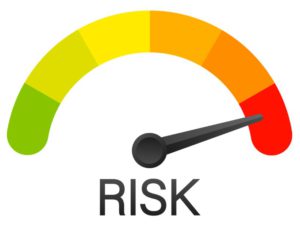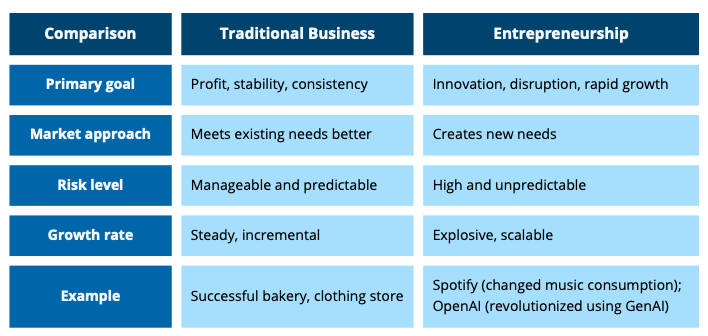
Business vs. entrepreneurship: What’s the difference?
Posted by
We tend to toss around the terms “business” and “entrepreneurship” pretty interchangeably, but they’re not the same thing. Think of it this way: all entrepreneurs start a business, but not all businesses are started by entrepreneurs (in the purest sense of the word).
At its core, a business creates, delivers, and sells a product or service to meet customers’ needs and make a profit. Entrepreneurship, however, involves innovation, risk-taking, and identifying new opportunities to solve problems in ways that haven’t been done before — and it’s a journey that can lead to rapid growth and market disruption.
Focus and goal: Stability vs. disruption
The business mindset
A traditional business approach focuses on stability, consistency, and optimizing existing models. The goal? Maximizing efficiency and profit within an established market.
Example: You plan to open a new sandwich shop in your hometown. You’re entering a highly competitive market (food service), but you know you’ll succeed by offering excellent quality, friendly service, and a convenient location. Plus, there aren’t any other sandwich shops nearby. This business model (selling sandwiches) is proven. Your job is to execute it well.
The key traits associated with a successful business include consistency, following a business plan, and effective operational management.
The entrepreneurial mindset
An entrepreneur is a visionary who identifies a gap in the market or a novel solution to a common problem. These people focus on innovation, rapid scaling (growth), and disrupting the status quo.
Example: Think about DoorDash or other similar food delivery apps. Before they existed, people ordered food for delivery by calling a single restaurant. DoorDash didn’t invent the restaurant or delivery; its founders — four Stanford University Students (Tony Xu, Stanley Tang, Andy Fang, and Evan Moore) — simply identified a need in their community. What began as a class project to solve a problem (helping local restaurants deliver food more efficiently) grew into a multibillion-dollar company. These students invented the process by creating a platform that connects thousands of restaurants, customers, and independent drivers. This entirely new model revolutionized the way people eat and how restaurants operate.
The key traits associated with entrepreneurship include creativity, risk-tolerance, visionary thinking, comfort with uncertainty, and a willingness to dream big and focus on large-scale growth.

Risk and reward
Managed risk
Starting a business involves managed risk. You know the market. You know the competition. You can generally predict potential income and expenses based on industry standards.
Is there any financial risk? Sure. You might need a small business loan, and there’s no guarantee you’ll attract enough local customers to cover rent and salaries. The rewards if you do? Steady income and local success.
Take our sandwich shop. Its goal is predictable: steady annual growth by attracting new customers, maintaining a stable customer base, and providing reliable service. Its risks — losing a few customers, prices for ingredients and supplies increasing, and building rent going up — are generally manageable.
High risk, high reward
Entrepreneurship, on the other hand, involves much higher risk. Because the idea is new, there’s no guarantee the market will accept it. About 90% of startups fail for a variety of reasons, like lack of market interest, poor financial planning, competition, and struggles with the product or marketing approach. But if you can unlock the key to positioning yourself in that 10%, the potential reward is exponentially greater — the chance to build a billion-dollar company (like DoorDash!) and fundamentally change an industry.
Many entrepreneurs put their life savings and often venture capital (investor money) into an unproven idea. If it fails, they can lose everything. If it succeeds, the reward can be massive, global-level success.
Ever stay at an Airbnb? Its founders faced tremendous risk. No one believed that people would let strangers sleep on their couch or in a spare room. But Joe Gebbia, one of the founders, had an experience that planted the seed for this company. While studying at the Rhode Island School of Design, he let a complete stranger sleep on an air mattress in his apartment. He was a little apprehensive, but the stay was smooth.
A couple of years later, after moving to San Francisco, he revisited the concept when he noticed a shortage of accommodations. The city was hosting a major design conference, and hotel rooms were limited. Gebbia and his roommates decided to host three guests, who each paid $20 per night to sleep on air mattresses. This successful trial run convinced them of their idea’s potential, which later evolved into Airbnb.
Following the rules vs. making them
Execution and following the plan
In a typical business, success comes from excellent execution of a tried-and-true formula, with established practices guiding operations. The structure is often hierarchical and standardized.
For example, a national restaurant chain follows the established rules of the restaurant industry and the example of the original restaurant. The chain operates by the book, with standardized decor, layout, and menus, safety protocols, hiring and training procedures, and employee scheduling.
Pivoting and creating the rules
Entrepreneurs often start with an idea (or hypothesis) and constantly test, fail, and pivot based on market feedback. They’re often building the plane while flying it, and the structure — at least initially — is flexible and chaotic.
Walt Disney initially created Oswald the Lucky Rabbit, which he “lost” in a financial dispute with distributor Charles Mintz. Eventually, Disney created Mickey Mouse, along with the brand we know and love. As a Yale student, Frederick W. Smith earned a C on a delivery project. Later, he developed that idea into FedEx, a global leader in logistics and delivery. Rejected by nearly 40 publishers, Arianna Huffington refused to give up her quest to become a published author. Ultimately, she founded The Huffington Post and Thrive Global.

Choosing your path
Intrigued by business and entrepreneurship? Knowing the difference can help you choose the path that aligns with your personality and goals.
If you lean toward business
You may thrive on structure, clear processes, and optimization. You like seeing results from hard work and may prefer a stable career path. Consider taking high school classes, enrolling in summer programs, or pursuing a college major in financial management, marketing, or operations. You might gravitate toward a career as a manager, analyst, accountant, or marketing specialist. Maybe someday you’ll own a small business or franchise.
If you lean toward entrepreneurship
You’re likely a problem-solver, risk-taker, and creative thinker who’s comfortable with uncertainty and ambiguity. You want to build something entirely new. Consider classes and programs focused on design thinking, startup accelerators, or innovation challenges. Your future career may include roles such as founder, CEO of a startup, product developer, or venture capitalist.
Ultimately, both paths are valuable, rewarding, and contribute massively to the economy. Whether you want to run the best café in town (business) or create the next viral social media platform (entrepreneurship), understanding these distinctions is the first step toward building your successful future. Want more ideas? Check out Your Future in Business and Entrepreneurship, our latest guide.
Blog Categories
- Career Advice
- College Admissions
- Colleges & Universities
- Financial Aid and Scholarships
- For Counselors
- For Parents
- For Students
- Gap Years
- Mental Health and Wellness
- Online Learning
- Performing and Visual Arts
- STEM Majors and More
- Summer Programs
- Teen Volunteering
- Trade & Vocational Schools
- Tutoring & Test Prep

Organization with listings on TeenLife? Login here
Register for Free
We’re here to help you find your best-fit teen-centered academic and enrichment opportunities.
Forgot Password
"*" indicates required fields








